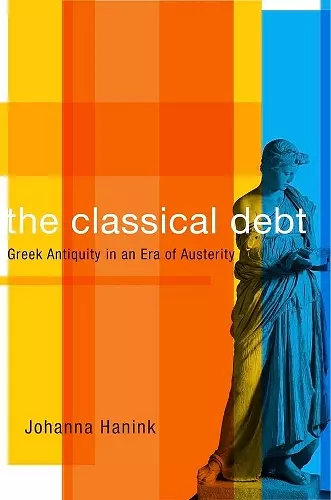The Classical Debt
Greek Antiquity in an Era of Austerity
Format:Hardback
Publisher:Harvard University Press
Published:25th May '17
Currently unavailable, and unfortunately no date known when it will be back

Ever since the International Monetary Fund’s first bailout of Greece’s sinking economy in 2010, the phrase “Greek debt” has meant one thing to the country’s creditors. But for millions who claim to prize culture over capital, it means something quite different: the symbolic debt that Western civilization owes to Greece for furnishing its principles of democracy, philosophy, mathematics, and fine art. Where did this other idea of Greek debt come from, Johanna Hanink asks, and why does it remain so compelling today?
The Classical Debt investigates our abiding desire to view Greece through the lens of the ancient past. Though classical Athens was in reality a slave-owning imperial power, the city-state of Socrates and Pericles is still widely seen as a utopia of wisdom, justice, and beauty—an idealization that the ancient Athenians themselves assiduously cultivated. Greece’s allure as a travel destination dates back centuries, and Hanink examines many historical accounts that express disappointment with a Greek people who fail to live up to modern fantasies of the ancient past. More than any other movement, the spread of European philhellenism in the eighteenth and nineteenth centuries carved idealized conceptions of Greece in marble, reinforcing the Western habit of comparing the Greece that is with the Greece that once was.
Today, as the European Union teeters and neighboring nations are convulsed by political unrest and civil war, Greece finds itself burdened by economic hardship and an unprecedented refugee crisis. Our idealized image of ancient Greece dangerously shapes how we view these contemporary European problems.
The Classical Debt is a fascinating foray into the process by which Europeans molded their own and modern Greek identity on the basis of ancient Greek ideals, and this shared culture helps explain the antagonism towards the Greeks when their path seems to veer away from that of the rest of Europe. -- John Psaropoulos * Times Literary Supplement *
Cleverly connects Western Europe’s investment in ancient Greek origins with the decade-old Greek debt crisis. -- A. E. Stallings * Wall Street Journal *
One of the most striking new books about the legacy of Greco-Roman antiquity. -- Emily Wilson * New Statesman *
This book certainly succeeds in reminding or making the reader aware of the invention of Greek antiquity, and our role in the ongoing survival of that invention. It is lucidly written, with rigorous but not overwhelming detail…It is bold and uncompromising…Hanink has written an important contribution to the ongoing debate about why Classics matters, which is also a wake-up call to encourage us to do Classics in a more critical, thoughtful way, and to hold to account those who use the imagery of an idealized Greek antiquity in a way which does a disservice both to the complexity of the ancient world, and to the modern Greek nation. -- Catherine Rozier * Bryn Mawr Classical Review *
Hanink shows how long-standing ideas about Greece’s idealized past have explosive implications for how Greece’s current crisis is conceived…Hanink provides a penetrating and valuable analysis of how our perceptions of the ancient past can become explosively mixed with politics…Even if Hanink’s book can’t cure Greece of its current woes, it can (and does) offer a stimulating take on a situation that too often has been the recipient of hardened ways of thinking. May it be read vigorously and with an open mind. -- Brett Miller * PopMatters *
Hanink demonstrates enviable skill in harnessing complicated knowledge in a way that makes it accessible to all readers. Her book, while being valuable to specialists, is written so that it could be read and enjoyed by a wider audience. -- Myrto Malouta * Journal of Greek Media and Culture *
The Classical Debt is valuable book that traces the history of the concept of ancient Greece as the cradle of western civilization, ranging from its origins of this notion to the impact that it has had on contemporary perceptions of Greece…It deserves to be read by anyone who may have once questioned or marveled at the alleged wonder that was Greece. -- Charlotte Van Regenmortel * Economic History Review *
An immensely well-written and provocative book, Johanna Hanink’s The Classical Debt: Greek Antiquity in an Era of Austerity tightly weaves together the threads of past and present like an ancient Greek warp-weighted loom. * EuropeNow *
Hanink helps us see modern Greece through the eyes of a classicist, and ancient Greece through the eyes of a keen observer of modern Greece—a wonderful and winning combination. The Classical Debt is a clever meditation on if, and why, antiquity still matters. -- Mary Beard, author of the New York Times bestseller SPQR: A History of Ancient Rome
Hanink’s new book depicts the pernicious intertwining of Classics with Orientalism during the worst of the Greek economic crisis. Antigone’s determination to violate unjust laws suddenly acquires a fresh interpretation in our post-Brexit Europe. -- Yanis Varoufakis, author of And the Weak Suffer What They Must? and former Greek Minister of Finance
[A] fascinating study. -- Louis A. Ruprecht Jr. * Arion *
ISBN: 9780674971547
Dimensions: unknown
Weight: unknown
352 pages